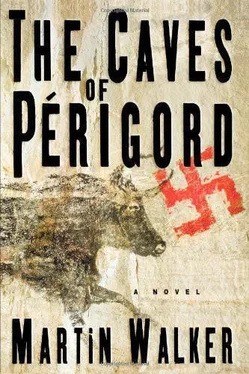Martin Walker - The Caves of Perigord
Здесь есть возможность читать онлайн «Martin Walker - The Caves of Perigord» весь текст электронной книги совершенно бесплатно (целиком полную версию без сокращений). В некоторых случаях можно слушать аудио, скачать через торрент в формате fb2 и присутствует краткое содержание. Жанр: Триллер, на английском языке. Описание произведения, (предисловие) а так же отзывы посетителей доступны на портале библиотеки ЛибКат.
- Название:The Caves of Perigord
- Автор:
- Жанр:
- Год:неизвестен
- ISBN:нет данных
- Рейтинг книги:4 / 5. Голосов: 1
-
Избранное:Добавить в избранное
- Отзывы:
-
Ваша оценка:
- 80
- 1
- 2
- 3
- 4
- 5
The Caves of Perigord: краткое содержание, описание и аннотация
Предлагаем к чтению аннотацию, описание, краткое содержание или предисловие (зависит от того, что написал сам автор книги «The Caves of Perigord»). Если вы не нашли необходимую информацию о книге — напишите в комментариях, мы постараемся отыскать её.
The Caves of Perigord — читать онлайн бесплатно полную книгу (весь текст) целиком
Ниже представлен текст книги, разбитый по страницам. Система сохранения места последней прочитанной страницы, позволяет с удобством читать онлайн бесплатно книгу «The Caves of Perigord», без необходимости каждый раз заново искать на чём Вы остановились. Поставьте закладку, и сможете в любой момент перейти на страницу, на которой закончили чтение.
Интервал:
Закладка:
“We can’t all go to your farm. There are twenty of us now,” objected McPhee. “Too many of us to feed.”
“You don’t know the Perigord,” Francois grunted over his shoulder, and turned, buttoning his trousers. “They’ll feed us all, warm milk straight from the cow, some chestnut bread and goat cheese. But we don’t all go at once. We three go first with Frise, then Manners and I go on to meet my brother and the radio operator. McPhee, you and Frise then take back some milk, and bring the boys to the farm, no more than four at a time. Then we all meet tonight at the big Rouffignac cave. I know that area. There are good plateaus for parachute drops, a lot of woodland to train the boys in the Barade forest, and not enough roads for the Germans.”
“What about food?” Manners asked.
“A lot of small farms. We’ll be fine,” said Francois. “Now let me have one more cigarette and then let’s get that milk.”
“What are the chances that someone among those small farms will tell the Germans, or the Milice?” McPhee broke in. “Just because you know the area, Francois, that doesn’t mean you can trust everybody.”
Francois looked at the two men for a long moment, than came and squatted in front of them. “A year ago, I would not even have taken the risk of coming back here, to my own chateau, my own district, where I was brought up with half the boys and was taken fishing with their fathers, and fed tartines by their mothers.”
“But that was last year,” he went on. “Before the RAF started sending a thousand bombers every night against Hamburg and the Ruhr. Before the Germans were beaten at Stalingrad, before we threw them out of North Africa, before we knocked Mussolini out of the war and put our armies back into Italy. And when that happened, Hitler dropped this pretense of southern France being run by Vichy and sent his armies down here too. So now we see the Boche trucks and soldiers, and watch them take our food and chase our women and arrest our young men to send them to Germany to work in their factories. Now we are occupied, and so the only people who might betray us are those too committed to Vichy to change their coats.”
“That’s still a lot of Frenchmen,” said McPhee grimly.
“True. A year ago, to be honest, I’d have said most Frenchmen either supported Vichy or weren’t prepared to do anything against it. Most people want a quiet life, and so long as there were no German troops down here, people could fool themselves that the war didn’t much concern them. But now only a fool thinks the Germans have a chance of winning, and anybody with any sense wants to make sure they are on the right side when this war is over.” He stopped to duck his head under his jacket and light another cigarette, and emerged to blow a thick plume of smoke into the cave. “Your war may be decided. Ours isn’t. I keep telling you the big question is whether the right side will be the Communists or the Gaullists.”
“Where the hell do you get all the smokes?” McPhee said. “They’re supposed to be rationed.”
“They are. It’s a system they call the decade . Every ten days, an adult is entitled to two packets of twenty, or some rolling tobacco. But every adult includes a lot of nonsmokers. My brother has a friend who’s a gardener in a nunnery. Eighty nuns and none of them smoke. So the gardener gets their ration, and gives most of them to my brother for his boys. And then this is the Perigord. The best tobacco in France is grown here. Come on; let’s get moving.”
The B Mark II transmitter was a feeble but cumbersome beast. It was two feet long, weighted thirty pounds, required an aerial seventy feet long, and could transmit its dots and dashes of Morse at no more than twenty watts. Berger had already lost one radio operator in Bergerac when the Germans started using the trick of turning off the power in one subsection of the city after another to see when the signal died. Now he refused to use main current at all and had rigged up a small dynamo that could be powered by a bicycle, maintaining that the risk of shifting the transmitter from place to place around the woods of Perigord was less than that of detection.
Francois and Manners drafted their message, and Berger took the back wheel from one of the bikes to rig the dynamo, and the radio operator pulled off the top silk sheet from his one-time pad and began to encode. Manners checked the coding, and they left him alone to transmit; another of Berger’s security rules. They had cycled about an hour down the woodland tracks and came to the brink of a steep hill where the track wound down to a road. The embankment of a railway loomed up behind it, and the stately arches of a viaduct bridging a steep valley on the far side of the road. Just before the viaduct a small building stood beside the rail track, the raised red-and-white bar of a level crossing beside it, ready to seal off the small road that disappeared steeply into the valley. A red signal flag was tied to the base of the bar.
“Miremont-Mauzens,” said Berger. “It’s a railway halt. That’s where we meet them. The flag means it’s safe.” He turned to his brother. “Francois, you stay here with the bikes. They know where you’re from. You’d just annoy each other, get into an argument.”
Francois shrugged and lit a cigarette. “Don’t worry, my dear brother. I am getting quite good at staying out of arguments. Just ask our English friend how polite I am being to our grumbling American, difficult as it is.”
“McPhee’s all right,” Manners said. “He was just cold and tired and irritable this morning. So was I.”
“That I understand,” said Francois. “Let’s hope that is all it is. But I get the feeling that he likes needling me.”
“So do I,” grinned Manners, to take the sting out of the remark. “So would anybody who knows you. You’re rich, a famous writer, handsome, and a war hero. Don’t be surprised if the rest of us mere mortals try to take you down a peg or two, Francois. If you were as dumb and ugly as me and Berger here, you’d have no trouble.”
“You see why I like this cunning Englishman?” Francois smiled at his brother. “Even when he disciplines me, he flatters me.”
“He didn’t flatter me,” said Berger flatly.
“Well, you haven’t seen him fight yet. I did, in North Africa. He has our French elan, and their German thoroughness. We’re lucky to have him on our side.”
“We had good teachers,” said Manners, making a joke of it. “We’ve been fighting you bloody Frenchmen since 1066.”
Berger and Manners walked down the path to the road and crossed the rails to use the cover of the trees to reach the building. They had fifty yards to go when Berger stopped and turned and looked grimly at the Englishman.
“He calls himself Marat, and I don’t trust him very far,” said Berger quietly. “He used to be a railway man, but went off to fight in Spain with the Communists. He came back to France in 1939, and then disappeared. If you ask me, I think he went to Moscow. He came back in late 1941, after Hitler invaded Russia. He claims to have men everywhere, in Brive and Perigueux and Limoges, even Bordeaux. I think what he has mostly is his old friends on the railways and in the rail unions. And a lot of Spaniards, refugees from Franco who fled here when the fascists won. His information has been good on the rail system and convoys. He wants arms, but there’s no sign of their using them against the Germans. On the other hand Hilaire said I had to take you to him and arrange supplies. So I follow orders. I won’t speak much.”
“He and Francois are old enemies?”
“He and Francois have never met. They just hate each other on principle. If they met, they’d start to argue. Francois calls himself a socialist-they hate the Reds more than anybody. They’d probably try to kill each other.”
Читать дальшеИнтервал:
Закладка:
Похожие книги на «The Caves of Perigord»
Представляем Вашему вниманию похожие книги на «The Caves of Perigord» списком для выбора. Мы отобрали схожую по названию и смыслу литературу в надежде предоставить читателям больше вариантов отыскать новые, интересные, ещё непрочитанные произведения.
Обсуждение, отзывы о книге «The Caves of Perigord» и просто собственные мнения читателей. Оставьте ваши комментарии, напишите, что Вы думаете о произведении, его смысле или главных героях. Укажите что конкретно понравилось, а что нет, и почему Вы так считаете.












